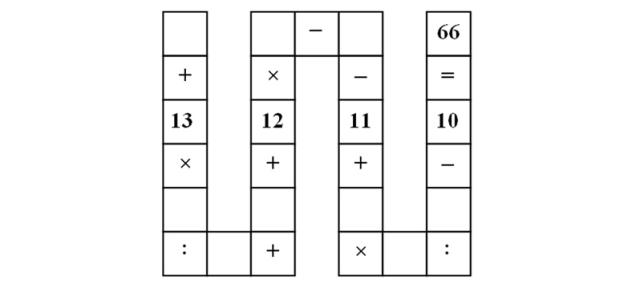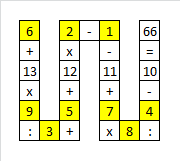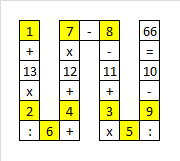Time for the brute force computing brigade to pick up the remaining solutions.
Assuming:
- each number must be used exactly once
- division must result in a whole number
If we drop either of these assumptions, then this answer would be about 100 times longer.
If order of operations is respected, according to my script the possible answers are
3, 2, 1, 5, 4, 7, 8, 9, 6
3, 2, 1, 5, 4, 7, 9, 8, 6
5, 2, 1, 3, 4, 7, 8, 9, 6
5, 2, 1, 3, 4, 7, 9, 8, 6
5, 3, 1, 7, 2, 6, 8, 9, 4
5, 3, 1, 7, 2, 6, 9, 8, 4
5, 4, 1, 9, 2, 7, 3, 8, 6
5, 4, 1, 9, 2, 7, 8, 3, 6
5, 9, 3, 6, 2, 1, 7, 8, 4
5, 9, 3, 6, 2, 1, 8, 7, 4
6, 3, 1, 9, 2, 5, 7, 8, 4
6, 3, 1, 9, 2, 5, 8, 7, 4
6, 9, 3, 5, 2, 1, 7, 8, 4
6, 9, 3, 5, 2, 1, 8, 7, 4
7, 3, 1, 5, 2, 6, 8, 9, 4
7, 3, 1, 5, 2, 6, 9, 8, 4
9, 3, 1, 6, 2, 5, 7, 8, 4
9, 3, 1, 6, 2, 5, 8, 7, 4
9, 4, 1, 5, 2, 7, 3, 8, 6
9, 4, 1, 5, 2, 7, 8, 3, 6
If the equation is evaluated left-to-right, ignoring order of operations, the possible answers are
1, 2, 4, 7, 5, 8, 3, 6, 9
1, 2, 7, 5, 3, 4, 9, 8, 6
1, 2, 7, 5, 8, 9, 4, 3, 6
1, 3, 7, 5, 2, 6, 9, 8, 4
1, 4, 2, 8, 5, 7, 6, 3, 9
1, 4, 7, 5, 2, 9, 8, 6, 3
1, 4, 7, 5, 3, 9, 2, 8, 6
1, 5, 7, 4, 9, 3, 8, 2, 6
1, 6, 7, 8, 2, 5, 9, 4, 3
1, 8, 4, 7, 5, 2, 6, 3, 9
1, 8, 7, 2, 6, 3, 5, 4, 9
1, 9, 3, 7, 2, 5, 8, 4, 6
1, 9, 6, 2, 3, 7, 8, 4, 5
1, 9, 7, 2, 5, 3, 6, 4, 8
1, 9, 7, 3, 5, 8, 6, 2, 4
1, 9, 7, 5, 2, 8, 6, 4, 3
2, 1, 3, 6, 8, 7, 5, 4, 9
2, 1, 5, 3, 7, 9, 8, 4, 6
2, 1, 5, 3, 9, 6, 7, 4, 8
2, 1, 5, 8, 6, 3, 9, 4, 7
2, 3, 5, 6, 7, 8, 1, 4, 9
2, 6, 3, 5, 1, 7, 9, 8, 4
2, 6, 3, 9, 1, 7, 5, 8, 4
2, 6, 5, 4, 7, 8, 9, 1, 3
2, 6, 9, 1, 7, 3, 5, 4, 8
2, 7, 3, 5, 1, 9, 6, 8, 4
2, 7, 3, 6, 1, 9, 5, 8, 4
2, 8, 4, 5, 1, 7, 9, 6, 3
2, 8, 4, 9, 1, 7, 5, 6, 3
2, 9, 5, 6, 1, 3, 7, 8, 4
2, 9, 5, 7, 1, 3, 6, 8, 4
3, 1, 4, 8, 5, 2, 7, 6, 9
3, 1, 4, 9, 8, 6, 7, 2, 5
3, 4, 8, 7, 9, 5, 1, 2, 6
3, 5, 2, 7, 8, 9, 4, 1, 6
3, 5, 4, 1, 2, 7, 9, 8, 6
3, 6, 4, 8, 9, 7, 2, 1, 5
3, 6, 8, 7, 5, 1, 9, 2, 4
3, 7, 2, 4, 1, 9, 5, 8, 6
3, 7, 2, 5, 1, 9, 4, 8, 6
3, 7, 8, 5, 4, 1, 2, 6, 9
3, 9, 4, 6, 5, 1, 8, 2, 7
3, 9, 6, 5, 4, 8, 7, 1, 2
4, 5, 1, 7, 3, 6, 9, 2, 8
4, 6, 1, 5, 2, 7, 8, 3, 9
4, 6, 1, 7, 2, 8, 5, 3, 9
4, 6, 3, 9, 7, 2, 8, 1, 5
4, 9, 3, 2, 6, 7, 8, 1, 5
5, 1, 3, 9, 6, 7, 8, 2, 4
5, 1, 6, 2, 3, 9, 7, 8, 4
5, 1, 6, 3, 9, 7, 8, 2, 4
5, 1, 6, 9, 7, 8, 3, 2, 4
5, 1, 9, 2, 3, 6, 7, 8, 4
5, 1, 9, 2, 4, 3, 7, 8, 6
5, 1, 9, 3, 7, 2, 8, 4, 6
5, 2, 4, 1, 3, 7, 9, 8, 6
5, 2, 4, 9, 8, 7, 6, 1, 3
5, 3, 2, 7, 1, 6, 9, 8, 4
5, 3, 2, 9, 1, 6, 7, 8, 4
5, 4, 1, 9, 3, 8, 6, 2, 7
5, 4, 3, 9, 6, 1, 8, 2, 7
5, 4, 9, 1, 3, 2, 7, 8, 6
5, 4, 9, 1, 6, 8, 7, 2, 3
5, 4, 9, 1, 8, 7, 2, 3, 6
5, 4, 9, 3, 7, 6, 8, 1, 2
5, 4, 9, 6, 1, 3, 7, 8, 2
5, 4, 9, 7, 1, 3, 6, 8, 2
5, 6, 9, 3, 1, 4, 7, 8, 2
5, 6, 9, 7, 1, 4, 3, 8, 2
5, 7, 6, 9, 4, 8, 3, 1, 2
5, 7, 9, 1, 6, 2, 3, 4, 8
5, 8, 3, 1, 2, 4, 7, 6, 9
5, 8, 6, 7, 1, 3, 9, 4, 2
5, 8, 6, 9, 1, 3, 7, 4, 2
6, 2, 1, 5, 3, 9, 7, 4, 8
6, 8, 4, 5, 3, 9, 7, 1, 2
6, 9, 3, 1, 4, 8, 5, 2, 7
7, 1, 2, 4, 5, 8, 3, 6, 9
7, 1, 2, 8, 6, 3, 5, 4, 9
7, 1, 4, 9, 2, 8, 5, 6, 3
7, 2, 1, 8, 4, 6, 5, 3, 9
7, 2, 5, 1, 3, 4, 9, 8, 6
7, 2, 5, 1, 8, 9, 4, 3, 6
7, 2, 8, 1, 9, 4, 5, 3, 6
7, 3, 1, 9, 2, 5, 6, 4, 8
7, 3, 4, 9, 2, 5, 1, 8, 6
7, 3, 6, 4, 1, 5, 9, 8, 2
7, 3, 6, 9, 1, 5, 4, 8, 2
7, 4, 8, 5, 9, 6, 2, 1, 3
7, 6, 4, 2, 9, 8, 3, 1, 5
7, 6, 8, 9, 2, 5, 1, 4, 3
7, 9, 4, 8, 6, 2, 3, 1, 5
7, 9, 5, 3, 1, 8, 6, 4, 2
7, 9, 5, 6, 1, 8, 3, 4, 2
7, 9, 5, 6, 3, 1, 2, 4, 8
7, 9, 5, 8, 3, 6, 1, 2, 4
8, 1, 3, 9, 5, 2, 6, 4, 7
8, 1, 7, 3, 9, 5, 6, 2, 4
8, 1, 7, 5, 6, 4, 9, 2, 3
8, 1, 7, 9, 2, 4, 5, 6, 3
8, 2, 1, 6, 3, 5, 7, 4, 9
8, 2, 1, 7, 3, 6, 5, 4, 9
8, 3, 9, 5, 7, 6, 1, 2, 4
8, 4, 3, 9, 5, 7, 1, 2, 6
8, 4, 6, 5, 9, 3, 1, 2, 7
8, 4, 7, 3, 9, 5, 1, 2, 6
8, 6, 9, 3, 5, 2, 1, 4, 7
8, 6, 9, 5, 2, 1, 7, 4, 3
8, 6, 9, 7, 5, 3, 1, 2, 4
8, 7, 3, 1, 2, 4, 5, 6, 9
8, 9, 7, 1, 4, 2, 5, 3, 6
9, 2, 4, 7, 8, 6, 5, 1, 3
9, 3, 2, 4, 8, 7, 6, 1, 5
9, 3, 2, 5, 1, 7, 6, 8, 4
9, 3, 2, 6, 1, 7, 5, 8, 4
9, 3, 2, 7, 6, 5, 8, 1, 4
9, 4, 8, 6, 7, 3, 1, 2, 5
9, 6, 3, 8, 5, 7, 2, 1, 4
9, 7, 2, 8, 4, 3, 6, 1, 5



